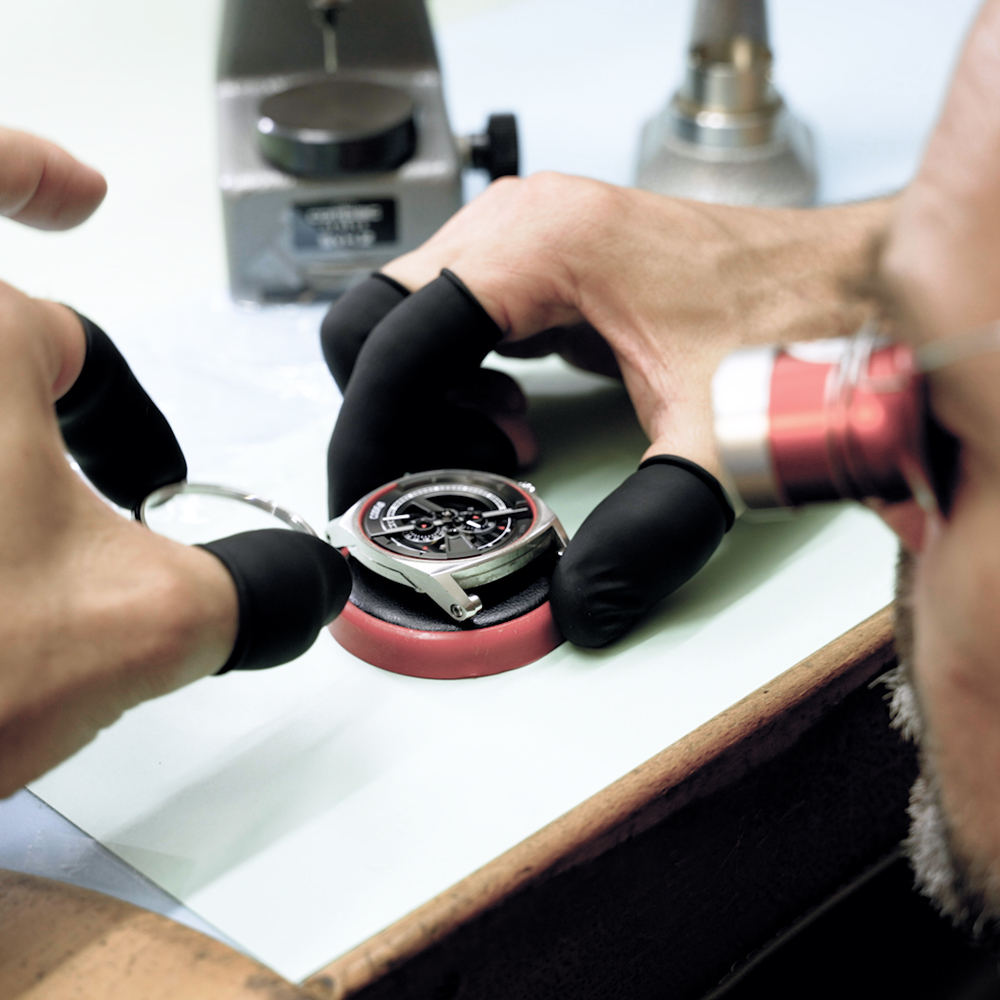5 essential actions for maintaining your mechanical watch
A beautiful mechanical watch is like a piece of high-end jewelry: well-maintained, this accessory will last a lifetime, if not more. Good maintenance involves a handful of essential actions that will help your timepiece travel through the ages without problems. Whether manual or automatic, check out the 5 instincts you should adopt in order to extend its longevity and enjoy it for many a year to come.
1. Wear your timepiece regularly
All watchmakers will tell you the same: a mechanical watch is a living thing that depends entirely on its wearer to function. That, incidentally, is what makes these distinctive objects so beautiful! So if you're thinking about preserving it by leaving it at the bottom of your closet, this is in fact the opposite of what you should do.
One of the reasons is as follows: the components of the movement are coated with lubricating oil in order to alleviate friction between the parts. If the timepiece remains unused for too long, the lubricant is at risk of drying up, thus immobilizing the gearwheels and leading to malfunctions.
Furthermore, in the case of automatic watches, it is the movements of the wrist that provide the energy required for the mechanism to function. Ideally then, you ought to wear your watch almost daily.
2. Avoid shocks and excess exposure to external conditions
This second point is more common sense, but a quick reminder never does any harm. In fact, even the most resistant timepieces are not always entirely immune to falls, shocks and scratches.
You should, therefore, avoid wearing your watch while participating in certain sporting (mountain trekking, for example) or manual activities (DIY work in the garden). On a daily basis, you should also make sure that the strap is correctly adjusted to your wrist; too loose, and the watch has more chance of bumping into furniture.
Likewise, you should refrain as much as possible from exposing it to external conditions that could damage the dial and its internal mechanism). Sunlight, in particular, but also excessive humidity can lead to condensation forming under the crystal. For watches whose watertightness allows beach and swimming pool use, a careful rinse is essential for removing any chlorine or salt.
3. Keep it away from magnetic fields
You should also be wary of the magnetic fields emitted by everyday electronic devices. Certain components of mechanical watches, such as the balance spring are particularly sensitive to them, and they may have detrimental effects on the precision of the movement.
Depending on the intensity of the waves, magnetic fields may cause a relatively severe malfunction of the movement, or even a complete loss of functionality in the worst case scenario. Even though it may seem difficult, try to keep your watch well away from smartphones, radios, magnetic devices, microwave ovens, etc.
If you notice an irregular ticking or that the watch is suddenly running slow, fast, or even stops working, the watch is probably magnetized. In that case, all you need to do is take it to a watchmaker, who will be able to neutralize the effects of the magnetization using a degausser.
4. Cleaning the crystal and case
While only a watchmaking expert is capable of handling the cleaning of the mechanism, that doesn't mean that you can't take care of the external parts of your watch. Whether we're taking about the lugs or around the bezel, you'd be surprised at the amount of impurity and dirt that's constantly making a home out of your timepiece.
It is, therefore, very important to frequently clean your mechanical watch with a microfiber cloth, a very soft brush, or a slightly damp cloth. If it is watertight, don't hesitate to use a little bit more water and soap, if necessary. From time to time, you can also simply polish the crystal with a dry dust-cloth in order to remove any dust and return your watch's shine. However, any cleaning products of uncertain chemical composition should be avoided at all costs!

5. Don't forget the servicing
Finally, you should know that even the best will in the world cannot replace the dexterity of a watchmaking professional. While the actions and precautions that we've seen so far are certainly important, it's not enough: a mechanical watch, just like any car, must without question be sent for servicing by a watchmaker on a regular basis.
Very complex, a timepiece's mechanism must be handled with extreme care; only an expert watchmaker is capable of taking care of its maintenance. It is usually advised that you schedule a maintenance visit every 3 or 4 years. While the types of services offered and their quality may vary from brand to brand, the servicing procedure generally remains the same everywhere.
During this procedure, the watchmaker will open the case and disassemble the movement entirely. They will then examine the parts one by one and clean them thoroughly, before proceeding by oiling the components and testing the hands. If necessary, certain parts may be replaced. Once the watch has been reassembled, they will also assess the watertightness of the case, the chronometric performance and the precision of the movement through a series of tests.
In short, a series of delicate processes that are essential for an automatic watch to function correctly, to be performed regularly by a qualified watchmaker in order to maximize its lifespan.
In conclusion
By following all of these recommendations to the letter, there's no doubt that your watch will live a long and happy life by your side. And if you only take on one of them, it should be that of entrusting its maintenance to a trusted watchmaker, who will know how to treat it properly. While these visits do of course involve a fee, bear in mind that that's nothing compared to the cost of the eventual repairs required by a neglected and poorly maintained watch!


